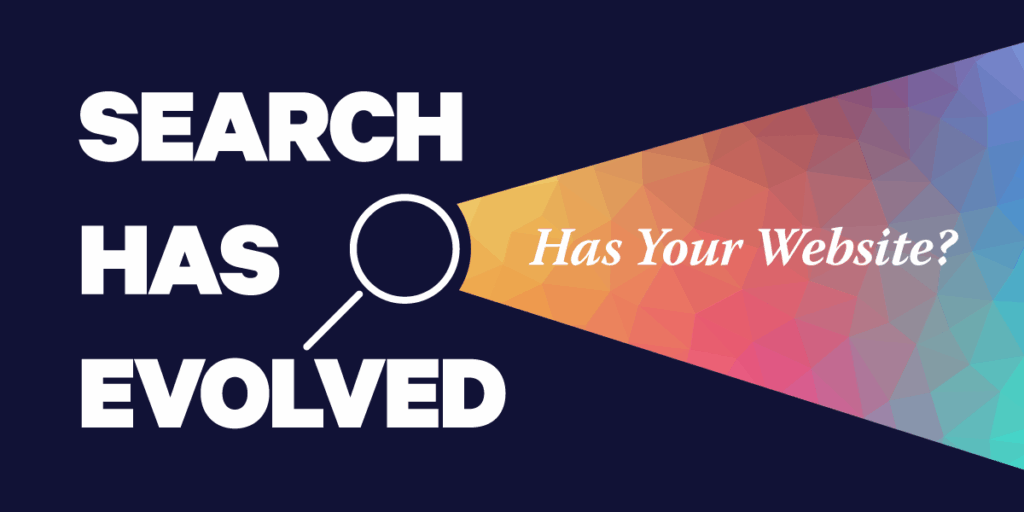Getting Found in the Age of AI: How to Make Sure Your Website Isn’t Left Behind

Search is changing fast. The days of scrolling through a list of blue links are fading. More and more, people are getting answers straight from AI systems like Google’s AI Overviews and platforms like ChatGPT and Anthropic. These tools summarize the web in a flash and talk to users like humans. It’s a powerful shift that’s completely transforming how people find and interact with information online.
For businesses, this isn’t just a small change. It’s a new frontier. If your website isn’t built with these tools in mind, you could be missing out. In this article, we’ll break down what’s happening in search right now, why it matters for your business, and how to prepare your site to show up and be cited by the AI tools that millions of people now rely on for answers.
What’s Really Going On With AI in Search?
Let’s break it down with a quick look at the two major players shaking things up:
Google AI Overviews: The New Top Spot
Google’s AI Overviews (once called the Search Generative Experience) are now showing up at the very top of search results, above ads, organic links, and everything else. These summaries pull information from multiple sources to answer questions directly, which means users might never scroll further unless they need more.
If you want your site to be seen, being cited in these Overviews is key. But it takes more than just ranking high. You need to create content that helps answer real questions in clear, useful ways. This is especially important for topics that require explanation or context.
Large Language Models (LLMs): The Rise of ChatGPT and Claude
Platforms like ChatGPT (by OpenAI) and Claude (by Anthropic) aren’t search engines, but they are where millions of people go to get information fast. These tools were trained on large portions of the internet, including public websites. So, while you can’t “submit” your site like you would to Google, you can influence how your content might show up in their responses.
That’s where your strategy matters. If your content is reliable, well-structured, and genuinely helpful, it has a better chance of becoming part of the “knowledge” these AI tools draw from when answering questions.
How to Optimize for AI: 4 Pillars of a Smart AI Strategy
1. Content That’s Easy for AI to Read and Summarize
- Lead with the answer: Summarize key points at the top of each section. Short and clear.
- Use strong headings: Organize your content with H1, H2, and H3 tags that follow a logical flow.
- Break things down: Use lists, tables, and bullet points to present info clearly.
- Add a real FAQ: Address common questions in natural language to help AI understand your content’s purpose.
2. Build Trust Through E-E-A-T
Google and AI systems favor content that shows:
- Experience: Share case studies, real results, and stories from your work.
- Expertise: Feature bios, credentials, and insight from knowledgeable team members.
- Authority: Earn backlinks and citations from respected publications and partners.
- Trust: Keep your site secure, accurate, and transparent with policies and contact info.
- And don’t forget: sharing original data or research can go a long way. AI tools crave unique, credible sources.
3. Solid Technical SEO Is Still Non-Negotiable
AI can’t understand what it can’t access. Make sure your site is:
- Crawlable and indexable: Clean up errors and stay on top of Google Search Console.
- Structured: Use schema markup (like FAQ, Article, LocalBusiness) to give context.
- Fast and mobile-friendly: Still essential for both users and search engines.
- Well-linked: A strong internal linking structure helps AI see how your content connects.
4. Write Like a Human (Because AI Learns from Us)
Keep your tone natural and your language clear. AI tools are trained on how people really write, so content that feels conversational, not robotic, resonates better with both readers and LLMs.
- Avoid jargon where possible.
- Explain complex ideas in simple terms.
- Use synonyms and related terms naturally to help AI understand the full topic.
Can You Get Your Site “Listed” in ChatGPT?
Short answer: not exactly. LLMs like ChatGPT don’t crawl the live web. Instead, they’re trained on snapshots of online content taken periodically, so you can’t submit a page like you do with Google. What you can do, though, is build content that’s strong enough to make the cut for those snapshots.
Your best chance at being referenced is to keep your content:
- Authoritative and accurate
- Unique and in-depth
- Easy to understand
- Well-structured and well-ranked in search
In other words: be the best answer out there.
Why It’s Time for an AI Audit
Traditional SEO isn’t enough. Businesses must optimize their sites for AI systems to stay competitive. That’s where an AI Audit comes in. Think of it as a deep dive into how your website is built, how it communicates, and how easy it is for AI tools to understand and trust your content.
Why it’s worth doing now:
- Unlock new visibility: Position yourself as a trusted source in AI-generated responses. Don’t get buried while competitors are surfacing in AI answers.
- Meet new user expectations: People are looking for fast, clear answers.
- Protect your brand: Help AI get your facts right so misinformation doesn’t take over.
- Get ahead of the curve: Build a future-proof strategy as AI continues to evolve.
Here at The Abbi Agency we help brands navigate this next wave of search, using smart strategy and deep expertise to keep your content front and center.
An AI Audit That Works
Here’s how our AI Audit can transform your online presence:
- Understand your goals: We start by getting to know your audience, your objectives, and how you’re currently performing online.
- Check your tech setup: We dig into crawlability, structured data, mobile optimization, and more to make sure your site is AI-friendly.
- Evaluate your content: We review your existing pages for AI-readiness and identify new content opportunities that align with what AI tools (and users) are looking for.
- Size up your competitors: We see who’s already showing up in AI Overviews and find ways to beat them.
- Build a roadmap: You’ll get a clear action plan with steps to improve your visibility, authority, and technical foundation.
- Keep evolving: AI search isn’t static, so we offer ongoing support to help you adjust and stay ahead.
Final Thought: Don’t Get Left Behind
AI isn’t just the future of search—it’s the present. And your digital strategy needs to evolve with it.
The good news is you don’t need to guess how. With the right approach, you can make your website a trusted resource for both humans and the intelligent systems shaping how they find information.



